Reinforcement Of Engineering Pedagogical Competencies Of Engineering Faculty Members And Doctoral Students
Abstract
New developments in engineering education and contemporary methodologies used for more effective teaching engineering, including problem solving, practice-oriented learning, active learning and implementation of CDIO principles, have risen the importance and revealed the need for contemporary pedagogical continuing education of engineering faculty members worldwide. A model for developing professional knowledge, skills, values and attitudes of engineering faculty and doctoral students along with the stages of achieving mastery in teaching engineering at Tallinn University of Technology (TalTech) are presented and analysed. Scientific models for the curriculum design have been analysed, an inductive model has been selected as the basis of curriculum design. Pilot survey of doctoral students and Delphi method were used in the research-based curriculum design, 12 skilful members participated in Delphi expert group working for three rounds taking account of the results of pilot survey. Learning theories’ integration for supporting learning with deep understanding was analysed and proposed during Delphi sessions. Didactical models, teaching and assessment methodology supporting learning with comprehension were proposed. The newly designed engineering pedagogy modularised in-service curriculum developed for the engineering faculty and doctoral students, its scientific basis, selected course content and learning outcomes are presented in this article.
Keywords: Curriculum design, didactical models, engineering pedagogy, modular curriculum, teaching methodology
Introduction
Education is a dynamic and rapidly developing system responding to growing societal demands and technological challenges.
Since the last half of the 20th century, the International Society for Engineering Pedagogy (IGIP) has been the only distinguished and acknowledged developer and provider of engineering pedagogical and STEM (Science, Technology, Engineering, Mathematics) didactical education for the engineering faculty, doctoral students and technical teachers worldwide. Over 2000 engineering educators from different countries over the world have passed the courses of engineering pedagogy at internationally accredited IGIP entres (International Society for Engineering Pedagogy, 2021; Zafoschnig, 2014).
New developments in engineering education and new contemporary methodologies used for more effective teaching engineering have risen the importance and revealed the need for redesigning continuing education in engineering pedagogy and STEM didactics. Many technical universities have implemented compulsory engineering pedagogy courses for engineering faculty already, as nowadays engineering educators have to know not only what to teach, but also how to teach effectively in order to support students’ development and learning with comprehension and deep understanding. During recent years the dissemination of IGIP ideas and curriculum has been accelerated though accreditation of new IGIP training centres all over the world. Also new international projects, like Erasmus+ ENTER project for education of engineering pedagogical trainers have created curricula for propagation of IGIP recognised ideas and prototype curriculum in education of engineering educators worldwide.
IGIP, being an internationally recognised flagship of engineering pedagogy, has constantly been in control of and managing the design and development of its prototype curriculum. In 2020 the Dresden version of IGIP prototype curriculum was launched. The overall aim of the IGIP curriculum design was to establish an effective modularised outcome-based curriculum on the basis of scientific principles ensuring the required engineering pedagogical competencies for engineering faculty, doctoral students and technical teachers. The IGIP curriculum is designed to be a flexible, dynamic, supportive and effective curriculum (Zafoschnig, 2014).
Development of the new modularised engineering pedagogy curriculum at TalTech for the engineering faculty and doctoral students, its scientific basis and analysis of the design process are presented in this article.
Professional Development of Engineering Educators at TalTech
At TalTech an integrated system supporting professional development of engineering educators was designed in 2019. The designed system consists of three stages of development for achieving mastery in effective teaching engineering. On every stage there is a support system for educators.
Stages of achieving mastery in teaching engineering through lifelong learning are presented in figure 01. On the first stage, engineering educators start teaching after graduating TalTech least on Master level. They start teaching the way they were once taught when they were students. On this level university offers in-service basic courses in amount of 6 ECTS.
On the second stage faculty members having acquired the PhD degree may select between a teaching or research track. When selecting a teaching track, pedagogical courses of 6 ECTS have to be passed for starting a teaching job at the university (offered on the first stage). Further field-specific continuing education pedagogical courses are offered for effective teaching and supervision, and for reaching the next stage. In School of Engineering and School of Science at TalTech field-specific pedagogical courses are offered in the amount of at least 20 ECTS by Estonian Centre for Engineering Pedagogy at TalTech. Also support of a mentor, peer-observation and covision is afforded for the faculty with the aim of supporting the process of reaching the highest level of mastery in teaching. Faculty members participate on international educational conferences, publish articles and share their best practices.
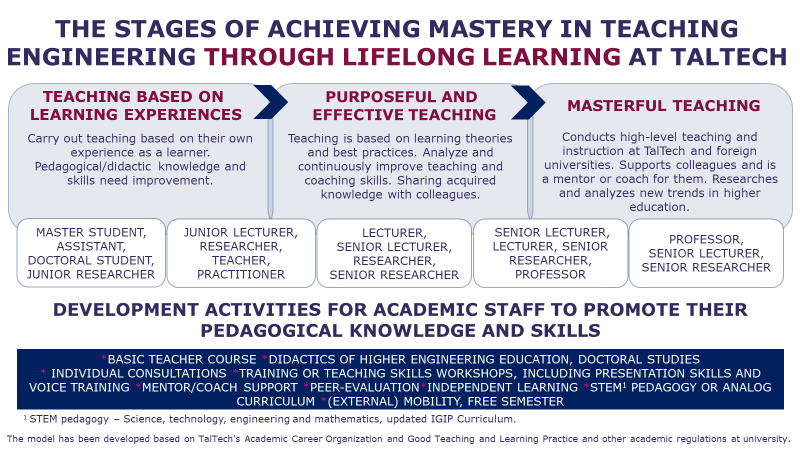
On the third stage, engineering educators reach the level of masterful teaching. They conduct higher-level instruction and supervision. They support their colleagues, are mentors for their younger colleagues, and participate in educational research analysing new trends in engineering education. They share their best practices, participate on international educational conferences as invited speakers. Usually these faculty members are professors, senior lecturers and senior researchers.
According to TalTech Curriculum Statute, all doctoral programs consist of 60 ECTS of doctoral studies and 180 ECTS of the doctoral thesis. A doctoral curriculum comprises three modules: general studies (min 6 ECTS credits), core studies (min 12 ECTS credits), special studies (min 24 ECTS credits).
Optional subjects of general studies are Philosophy of Science, Organisation of Research and Education, Didactics in Higher Education, Management Psychology, Innovation and Academic Writing. Mandatory subjects of special studies are Teaching Practice (min 6 ECTS credits) and Doctoral Seminars (min 6 ECTS credits). If doctoral students want to become a university teacher, Didactics of Higher Education is a prerequisite for reaching the second stage of achieving mastery in teaching.
A model for developing of professional knowledge, skills and attitudes of engineering faculty and doctoral students was designed at TalTech in 2019 (see figure 02). Students’ feedback, self-evaluation, reflection, feedback from colleagues (peer-evaluation), mobility, data from Estonian Scientific Information System (CV, published articles, projects, education and qualifications, career, R&D related managerial and administrative work, honours and awards, etc) teaching philosophy statement, peer-observation results are presented, analysed and reflected in academic portfolio, also perceived training needs/pedagogical and professional competencies are assessed in the portfolio.
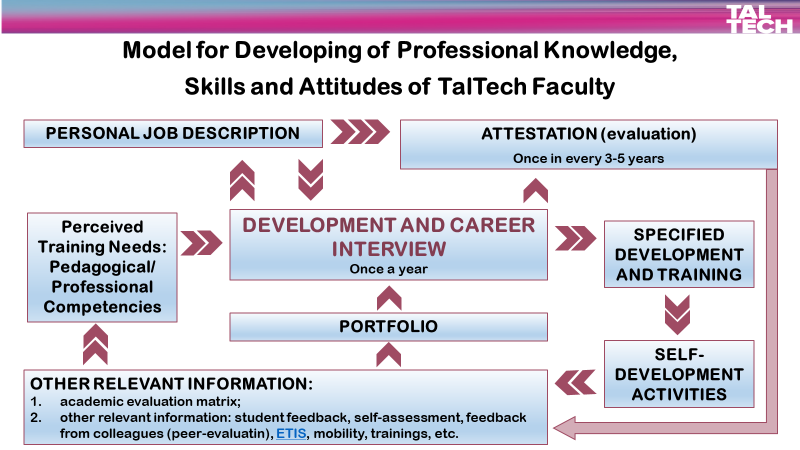
Academic portfolio is analysed during development and career yearly interview, where specified development and training needs are analysed and new self-development activities are determined. Portfolio is also analysed and assessed in the process of attestation every 3-5 years and in the process of application to any pedagogical job at TalTech.
The process of curriculum development was initiated with the aim of supporting professional development of engineering educators and for field-specific pedagogical in-service continuing education. During field-specific pedagogical courses engineering educators compile and present their teaching philosophy statement and academic portfolio.
Problem Statement
New teaching methodologies, including problem-based, project-based and team-based learning, practice-oriented learning, CDIO (“Conceive, Design, Implement, Organise” worldwide initiative www.cdio.com), and active learning presume advanced and contemporary engineering pedagogical training of the engineering faculty. There is a need for contemporary pedagogical training of the engineering faculty members worldwide.
The engineering pedagogy curriculum development has been implemented since 2001 at TalTech. Since then 3 different curricula have been developed and implemented for engineering educators’ and technical teacher pedagogical education. Education of technical teachers and engineering educators has been carried out both on Master level and in the form of life-long pedagogical education until 2014.
Since 2014 life-long pedagogical education of engineering educators, doctoral students and technical teachers have been carried out at TalTech. The existing life-long pedagogical in-service curriculum was designed in 2015. Today there is a need for a new, updated curriculum. Based on this exigency the process of development of a new continuing education curriculum has been initiated at TalTech School of Engineering in 2021. For the curriculum development process a task force has been created along with the group of experts of the curriculum design. Below the basic principles and the process of curriculum design and the first version of the newly designed modular curriculum are introduced.
Curriculum Development Process
Curriculum is a basement of contemporary education. Curriculum development is a constant process of construction, renewal and modification. Design, implementation and evaluation are three phases of a curriculum development. Curriculum development approaches are divided into technical and non-technical approaches. Technical-scientific approach focuses on outcome-based design; a non-technical approach in turn focuses on a learner, learning activities and methodology (Bhuttan et al., 2019).
Curriculum development models using technical approaches are divided into deductive and inductive ones. Ralph Tyler’s model is designed along with a deductive approach - learning goals and objectives are designed proceeding from general to specific.
Wheeler developed a cyclic model with following steps (Cheng-Man Lau, 2001):
Defining objectives and goals.
Designing learning experiences.
Selecting course content.
Organising learning experience.
Evaluating.
Hilda Taba’s inductive model of curriculum development introduced seven basic steps being designed using inductive approach as follows (as cited in Bhuttan et al., 2019):
Diagnosis of learners’ needs.
Design of goals and relevant objectives.
Compilation of relevant and valid course content.
Categorizing the content according to previous steps.
Selection of methods for course methodology.
Categorization of learning activities for learning with comprehension.
Determina the accomplishment of planned objectives.
In the present research, Hilda Taba’s inductive model of curriculum design has been used, proceeding from specific to general principles;
Research Questions
According to Hilda Taba’s inductive model of curriculum design the following research questions have been raised:
What are the needs of engineering educators/engineering faculty at TalTech?
What are the learning objectives relevant to the diagnosed needs of the faculty?
Which didactical models could be integrated for design of learning objectives?
Which learning content should be covered for reaching the planned learning outcomes?
How the content should be organised, taking account the interest and need of engineering educators?
How supportive learning environment should be created/designed?
Which learning theories could be integrated for supporting learning with deep understanding?
Which methodology should be selected for engaging learners with the content and selecting learning experiences?
How learning activities should be organised and categorised for helping learners to link activities with the content and learn with deep understanding?
How the accomplishment of learning objectives should be determined and evaluated so that both – teacher and learners could be involved in the evaluation process?
Purpose of the Study
Rapid development in engineering education assumes rethinking and redesign of pedagogical training of engineering educators, doctoral students and technical teachers.
Accordingly, the process of redesign of engineering pedagogical program for engineering faculty was initiated by Estonian Centre for Engineering Pedagogy, School of Engineering, TalTech.
Engineering pedagogical education needs to be updated also for the reason that TalTech joined the worldwide CDIO Initiative in 2021, thus the implementation of real-world engineering problems was in the spotlight of contemporary engineering education. The previous curriculum was designed in 2015 at TalTech, STEM didactics has rapidly developed during these last five years, contemporary course content and methodology have been renewed, new learning environments have been created.
The purpose of the study was to design a new version of engineering pedagogical in-service curriculum according to the changed needs of TalTech engineering educators, presented below.
Research Methods
There were two stages in the research process:
Pilot survey for doctoral students.
Delphi survey for curriculum design.
Pilot Survey for Doctoral Students
For the pilot survey a self-evaluation questionnaire evaluating perceived needs for effective teaching engineering was designed. The target group of the survey were doctoral students, who intend to become university teachers, participating in an elective course “Didactics of Higher Education”. The questionnaire was based on IGIP basic didactical model, designed for effective teaching engineering.
There were 21 statements in the questionnaire, covering all the levels of IGIP didactical model starting with design of learning outcomes, course content, learning environment, educational technology, teaching and assessment methodology, feedback, reflection and portfolio design. The survey was carried out online.
Likert-type forced choice scale was used as the basis for responses, enabling selection from “totally disagree” to “fully agree”. After each statement it was also possible to write a comment and explain the answer.
The sample of 36 doctoral students (N=36) participated in the survey, 21% of them were female and 79% male respondents. They all teach STEM subjects at TalTech for the first year.
Delphi Survey for Curriculum Design
Delphi method was used for the design of the new curriculum engineering pedagogical curriculum for in-service continuing education.
In compliance with Linestone and Turoff (1975) the Delphi method is suitable research method in the field of curriculum development, being a qualitative, structured and indirect interaction method.
To bind the present research into a manageable time limit, Delphi method was designed for three rounds. After each round, results were compiled and used to generate the next iteration process.
According to Powers-Erkkilä and Klempová (2006) in comparison with other methods, Delphi Method has the majority of benefits, ensuring holistic approach and high participation.
Taking account Linestone and Turoff (1975) standpoint, the following three-step Delphi process was designed:
1. Compilation of the panel of experts – the panel of 12 experts was compiled.
2. Designing three Delphi rounds:
Round 1 – unstructured, asking members to express any opinions that they might have on the issue in question.
Round 2 – from the first-round results, a questionnaire of 10 questions was designed of a series of statements inviting experts to express an opinion on a particular issue. Rankings for each statement summarized and forwarded to the respondents for round three.
Round 3 – experts re-ranked their initial statements based on the results of round two. Majority of observed shift in the opinion view was likely to be seen between the second and third rounds.
3. Results and conclusion – results of the iterative process were disseminated to the experts; a wrap-up discussion was carried out.
Members of the expert group participating in the present research were all specialists with high expertise in teaching engineering and skilled in the field of curriculum theory and practice in higher education of Estonia. Results of the pilot survey were considered in the Delphi survey.
Findings
Outcomes of the pilot survey of doctoral students outline the need for engineering pedagogical competencies as important prerequisites for effective teaching engineering (See figure 03).
As it could be seen in figure 03, majority of doctoral students (91%) participating in the survey express their need for better competencies in selection of suitable teaching models, methods and strategies; 88% of doctoral students need essential training for productive selection of assessment and feedback methods; 85% of respondents need higher level competencies for reflection and self-analysis; 81% of doctoral students need essential training for gaining better competencies in course design, and selection and integrating of didactical models, also 81% of respondents need more competencies for mastering the design of supportive learning environment. 78% of doctoral students need essential training for more effective setting educational goals and designing learning outcomes. Better competencies for teaching portfolio design is needed by 77% of doctoral students. 64% of respondents need essential training for understanding students’ individual differences and taking account of their learning styles for supporting learning with deep understanding and comprehension.
Results of this pilot survey were the input for the design of the curriculum using Delphi survey, considering the above described necessary competencies, that doctoral students have pointed out.
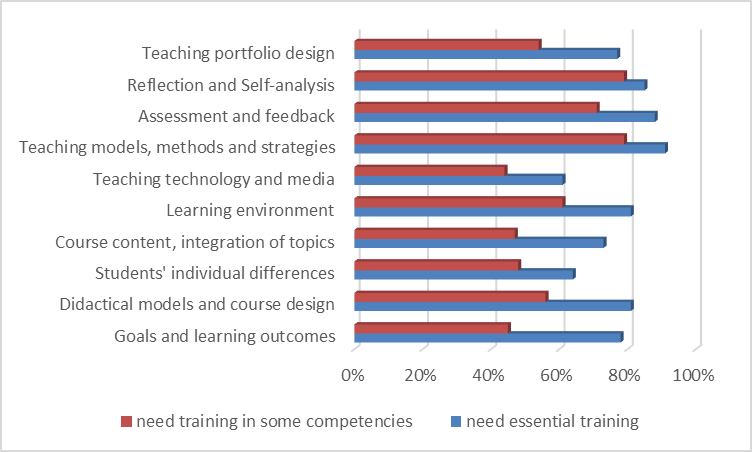
After three rounds of Delphi studies the preliminary structure of a new curriculum for engineering pedagogical continuing education has been designed (table 01) covering critical competencies pointed out by doctoral students in the pilot survey.
Discussion
During Delphi sessions all designed research questions were analysed. The first version of the curriculum was designed analysing and considering the results and pilot survey of doctoral students and the contemporary needs of engineering educators at TalTech.
Learning objectives of the curriculum were designed with reference to analysed needs of the faculty members and pilot survey of doctoral students. Having passed the engineering pedagogy curriculum, engineering educators will be able to:
design effective course based on selected didactical models;
manage and analyse the process of contemporary learning and teaching;
select suitable models, strategies and methods for effective teaching and learning;
select relevant methods for assessment and feedback;
use new technology, contemporary learning environments and ICT tools for effective teaching.
create a motivating learning environment and activate students, taking account of their individual differences;
compile and update their Academic Portfolio and Teaching Philosophy Statement;
participate in the process of mentoring and peer-evaluation.
Didactical models supporting integrated learning with deep understanding were analysed on the basis of the pilot survey. The following didactical models were recommended for the new curriculum:
Bloom’s revised taxonomy (Anderson & Krathwohl, 2001).
Feisel-Schmitz’s technical taxonomy (Crawley et al., 2014).
Marzano’s taxonomy (Marzano, 2000).
Hmelo-Silver’s taxonomy of PBL (Hmelo-Silver, 2004).
Learning theories’ integration for supporting learning with deep understanding was also analysed during Delphi sessions, considering the results of the pilot survey. The following model for integration of learning theories was recommended (see figure 04).
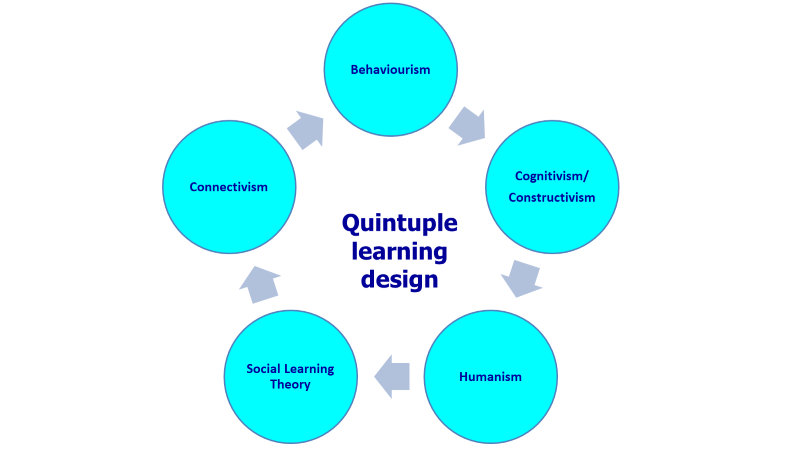
The quintuple learning design was recommended for supporting students’ learning with comprehension, integrating Behaviourism (Psychomotor dimension - skills, learning outcomes, safety regulations, deadlines, etc.), Humanism (Affective dimension - self- management, responsibility, self-development, peer-assessment, peer-evaluation, self-evaluation, self-regulation, time management, etc.). This includes Cognitivism/Constructivism (Cognitive dimension – knowledge, learning styles, active learning, critical thinking, deep understanding, etc.), Social Learning Theory (Transferable skills, group and team work, group processes, peer-instruction, discussions, interaction, meaningful learning, etc.), and Connectivism (E-learning, blended learning, hybrid learning, flipped classroom, M-learning, online classes, etc.).
Methodology of contemporary teaching was discussed for supporting effective integrated learning, considering also comments given in the pilot survey. The following methodology compendium was recommended for supporting learning with comprehension (see figure 05). It was recommended to design a balanced teaching methodology, providing systematic knowledge, supporting abstract, technical, analytical and critical thinking, creativity, cooperation, and collaboration in real-life learning situations. (Rüütmann, 2019). It is recommended to balance deductive and inductive teaching. Engineering educators have the autonomy for selecting teaching methodology accordingly to the learning outcomes, course content, learning environment, teaching technology used and individual differences of students.
Along with teaching methodology, also the relevant assessment methodology was discussed and analysed in Delphi sessions, considering comments and results of the pilot survey. For the design of contemporary learning situations, a modern assessment methodology is needed. Not only grading, but also pass/fail assessment, peer-assessment, self-assessment, formative assessment, and group tests (where real-life situations and actual engineering problems are solved with the team), along with writing instructions for the next students for more effective lab work and problem solving, giving presentations, writing term papers, compiling video reports, organising poster conferences, etc. were recommended to use. Engineering educators have autonomy for selection of suitable assessment methods which are consistent with selected teaching methodology for assessing if students have reached the designed learning outcomes.
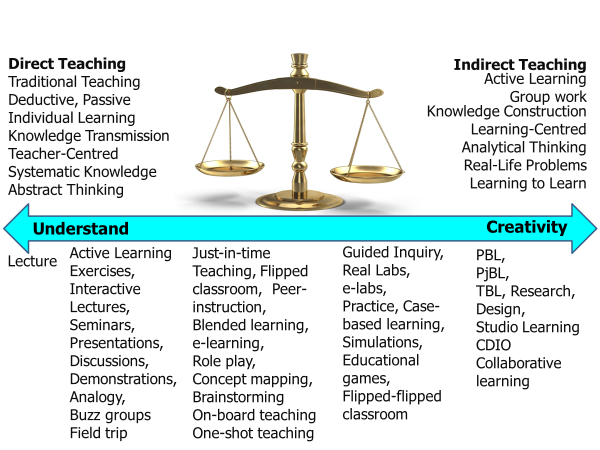
According to STEM didactics and engineering pedagogy science, teaching and assessment methodology should be selected according to the course content. The course content in turn must be selected according to designed goals and outcomes. Thus, the course content is of central importance in curriculum design (Rüütmann, 2019).
The course content needed for gaining planned learning outcomes of the designed curriculum was analysed, considering interests and needs of engineering educators and the results of pilot survey. The following course content was proposed and recommended by Delphi experts:
Basics of didactics, didactical models, design of goals and outcomes supporting critical thinking. Laboratory didactics, real labs, remote, distant and e-labs. Innovations in engineering pedagogy.
Taking account of learners’ preliminary knowledge, individual differences and learning styles. Time management and self-regulation.
Principles of designing course content and didactically effective learning materials and visual aids.
Curriculum and course design. Principles of educational psychology and sociology.
Ethics and engineering ethics. Teaching in multicultural classroom.
Principles of creation of supportive learning environment and selection of learning environments, selection of ICT tools and media for effective teaching. Digital education.
Interactive communication principles. Clear communication and scientific writing.
Selection of teaching models, methodology and strategies. Active learning and contemporary teaching methodology. Problem-based, project-based and collaborative learning.
Principles of selection of assessment methodology and feedback. Reflection, peer-assessment and self-assessment.
Teaching portfolio design and presentation.
Principles of constructive alignment (Biggs & Tang, 2011) were considered in the described curriculum design. For achieving constructive alignment, integration was created between the course content, intended learning outcomes, and teaching and learning activities. Once the goals and the corresponding learning outcomes were designed, learning activities were planned and the appropriate methodology was analysed and selected. Finally, the assessment methods, assessment criteria, and feedback principles were selected to determine whether and how each student has met the criteria described by learning outcomes. Constructive alignment ensures the coherence between learning outcomes, content, teaching and assessment methodology for an effective learning process.
Conclusion
Overview of the curriculum development process for designing a new modularised curriculum based on the IGIP updated prototype curriculum for reinforcement of engineering pedagogical competencies of engineering faculty and doctoral students is compiled. The newly designed modularised in-service curriculum of engineering pedagogical continuing education was presented and analysed along with proposed didactical models, teaching and assessment methodology and integration of learning theories. The presented first version of the designed curriculum will be piloted in September 2022 and further evaluation and relevant development and improvement of the curriculum will follow according to the feedback of students and educators.
Mission of technical universities is to support students’ effective learning and spark interest in STEM professions. Prerequisite for effective support for students’ higher-level learning is contemporary and effective contemporary instruction. It is important to analyse and consider what competencies students must acquire during their studies - what knowledge, skills and values they have after graduation. Constructive alignment ensures effectiveness and achievement of designed objectives.
IGIP prototype curriculum offers an effective framework for design of engineering educators’ integrated in-service curriculum, considering the needs of technical universities and promoting engineering students’ contemporary competencies.
References
Anderson, L. W., & Krathwohl, D. R. (Eds.). (2001). A taxonomy for learning, teaching and assessing: A revision of Bloom's Taxonomy of educational objectives: Complete edition. Longman.
Bhuttan, T. M., Xiaoduan, C., Ullah, H., & Javed, S. (2019). Analysis of Curriculum Development Stages from the Perspective of Tyler, Taba and Wheeler. European Journal of Social Sciences, 58(1), 14-22.
Biggs, J., & Tang, C. (2011). Teaching for Quality Learning at University. McGraw Hill.
Cheng-Man Lau, D. (2001). Analysing the curriculum development process: three models, Pedagogy, Culture and Society, 9(1), 29-44. DOI: 10.1080/14681360100200107
Crawley, E., Malmqvist, J., Östlund, S., & Brodeur, D. (2014). Rethinking Engineering Education. The CDIO Approach. Springer.
Hmelo-Silver, C. E. (2004). Problem-based Learning What and How Do Students Learn? Education Psychology Review, 16(3), 235-266.
International Society for Engineering Pedagogy (2021). Retrieved from www.igip.org
Lang Trudi (2006). An Overview of Four Futures Methodologies. Retrieved from www.soc.hawaii.edu/future/j7/LANG.html
Linstone, H. A., & Turoff, M. (1975). The Delphi Method: Techniques and Applications. Addison-Wesley.
Marzano, R. J. (2000). Designing a new taxonomy of educational objectives. Corwin Press.
Oreta, A. W. C. (2016). Engineering Educators Must Evolve, Too!. Journal of Professional Issues in Engineering Education and Practice, 142(1), 02515002.
Powers-Erkkilä, T., & Klempová, D. (2006). Method Case Studies. Retrieved from http://www.a-klinikka.fi/transdrug/attachments/toolkit_chap3_eng.pdf
Rüütmann, T. (2019). Engineering Pedagogy as the Basis for Effective Teaching Competencies of Engineering Faculty. Higher Education in Russia, 28(12), 123−131. DOI:
Zafoschnig, A. (2014). The Development of the new ING.PAED.IGIP Curriculum into an Umbrella for Modularised National and Regional Engineering Education Curricula. International Journal of Engineering Pedagogy iJEP, 4(1), 32-36.
Copyright information

This work is licensed under a Creative Commons Attribution-NonCommercial-NoDerivatives 4.0 International License.
About this article
Publication Date
01 February 2022
Article Doi
eBook ISBN
978-1-80296-123-2
Publisher
European Publisher
Volume
124
Print ISBN (optional)
-
Edition Number
1st Edition
Pages
1-886
Subjects
Land economy, land planning, rural development, resource management, real estates, agricultural policies
Cite this article as:
Rüütmann, T. (2022). Reinforcement Of Engineering Pedagogical Competencies Of Engineering Faculty Members And Doctoral Students. In D. S. Nardin, O. V. Stepanova, & E. V. Demchuk (Eds.), Land Economy and Rural Studies Essentials, vol 124. European Proceedings of Social and Behavioural Sciences (pp. 722-734). European Publisher. https://doi.org/10.15405/epsbs.2022.02.90

